Was Israel created in Edinburgh……by candlelight?
As today is the 100th anniversary of the signing of the Balfour Declaration or Balfour Letter written by the then Conservative Foreign Secretary, Arthur Balfour, 1st Earl of Balfour, it seems appropriate that we take a look at the background to his Magnum opus.
But first a look at the conservative and Conservative & Unionist nature of perhaps one of Scotland’s most influential societies: The Speculative Society of Edinburgh.
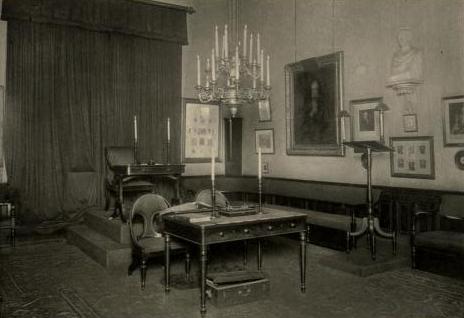 The membership of ‘The Spec’ as it is commonly known is drawn mainly from a small pool of middle and upper class graduates of The University of Edinburgh, and those outsiders they choose. The maximum number of ordinary members in any session (Wednesday evenings between September and March) is thirty.
The membership of ‘The Spec’ as it is commonly known is drawn mainly from a small pool of middle and upper class graduates of The University of Edinburgh, and those outsiders they choose. The maximum number of ordinary members in any session (Wednesday evenings between September and March) is thirty.
Above: Photo of the private debating room of The Spec in Old College illuminated by candles
New members must be invited by two ordinary members, a proposer and a seconder, and then gain approval of two thirds of the current ordinary membership. After acceptance an ordinary member must attend for three sessions before completing his course and gaining extraordinary privileges. So each year about ten new boys take the place of those who graduate.
So The Spec is a self-perpetuating elite. And a very conservative elite with a disproportionately great influence in Scots life and in particular the judiciary.
Keeping it in the family.
The Spec’s self-perpetuating influence is best illustrated by the number of senior lawyers from the same family who have dominated the law in Scotland. Take for instance the Clyde family, which boasted three generations of Law Lords and almost three Lord Presidents of the Court of Session.
I say almost, because the First and Second Lords Clyde were not joined by their grandson/son as head of the judges in Scotland. The third Lord Clyde, James John, lost out narrowly in the race for the top judge’s job to J. A. David Hope.
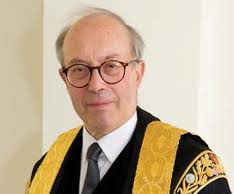 Lord Hope, after serving as Lord President moved south to the House of Lords and was until recently Deputy President of the Supreme Court.
Lord Hope, after serving as Lord President moved south to the House of Lords and was until recently Deputy President of the Supreme Court.
The Hopes are another clan, like the Clydes, in which Spec membership seems to run in the family. J. A. David Hope’s father was also a Spec member.
Now I don’t know if the five lawyers mentioned above were the ablest of their generation and this accounted for their success in life, but to me it seems odd that they have much in common, in that is they all went to Edinburgh Academy, all took law degrees at the University of Edinburgh and all were invited to become members of the all-male Speculative Society of Edinburgh. Oh, and another thing, they were all conservative, at least with a small c.
The right-wing/racist politics of The Spec.
Don’t take my word for it on conservative, take heed of J. A. David Hope, who, when a young advocate in 1968, wrote an article entitled “Current Politics and the Society’s Debates”, for the vanity publication “History of The Speculative Society Bicentenary Edition”. LINK
This article sets out the Society’s long established right-wing credentials and the fact that no left-wing government ever won a vote of confidence in a 30 year sample of debates on the question: “Is the present government unworthy of the confidence of the country?”
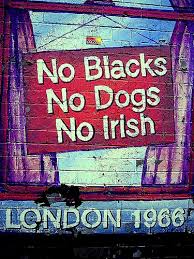 The young author examines debates and essays of the period, but, perhaps not surprisingly, omits some for that period, such as that of Mr St John in February 1955 who posed the question “Do the Wogs begin at Calais Carlisle”.
The young author examines debates and essays of the period, but, perhaps not surprisingly, omits some for that period, such as that of Mr St John in February 1955 who posed the question “Do the Wogs begin at Calais Carlisle”.
But Mr. Hope does reveal the fact that the society thought that it was impossible for white and coloured races to live together; was in favour of barring coloured immigration to all of the Empire’s dominions, and believed a colour bar should be maintained.
The Spec confers an Honorary Membership on the Hon. Arthur J. Balfour.
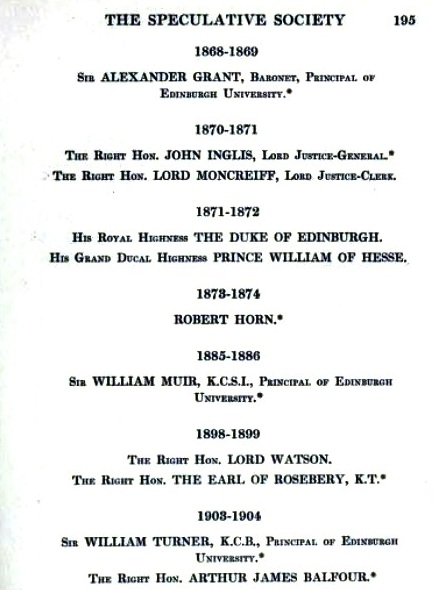 Mr. Hope also revealed in his article that in 1904 The Hon. Arthur J Balfour, M.P., former Prime Minister, and leader of the Conservative Party was made an Honorary Member of the Speculative Society.
Mr. Hope also revealed in his article that in 1904 The Hon. Arthur J Balfour, M.P., former Prime Minister, and leader of the Conservative Party was made an Honorary Member of the Speculative Society.
This is not a trifling honour as according to Section II; Art. 2 of The Laws of The Speculative Society of Edinburgh: “Honorary Members shall enjoy the same privileges with extraordinary members, and shall have precedence to all others on the roll.”
A. J. Balfour would have been the perfect candidate for an honour by the Spec as he was known for his racist views. It’s believed by many that his infamous letter to Baron Rothschild in 1917 which promised the country of another people, the Palestinians, to a third people (of a certain religion), the Jews, was motivated, not by a wish to see poor, working-class Jews fleeing anti-Semitic persecution in Eastern Europe achieve a homeland in Palestine, but by a wish that they would not settle in Britain.
Balfour opposed immigration into Britain by the subjects H M Government ruled or had once ruled, far less those it didn’t rule.
Singing the praises of Protestantism, Royalism & Unionism.
Balfour’s Empire Loyalist racism was hardly uncommon in this country at that time and was prevalent in the all-male sodality that was the Speculative Society of Edinburgh. Though a Scottish institution it was, in it’s attitudes, very much a northern branch of the British Empire.
This mindset is demonstrated in a response to a speech given by a law professor, John Hepburn Miller, Head of Constitutional Law & History, Edinburgh University, at a dinner to celebrate the 150th anniversary of the Spec in 1914. The ever active Honorary Member A. J. Balfour, under the guidance of chairman Lord Rosebery, was a key player on the Honorary Committee which organised this ‘Celebration’.
From the ‘Celebration’ we can see that Prof. Miller stated in his toast to “The Imperial Forces”: “we had the good fortune to live under a constitution which has been the envy of the whole civilised world; and if that has been our good fortune, and if the Protestant succession has been secured, let us never forget, sir, that that fortunate state of matters is due in no small measure to the standing Army, and likewise to one who was the idol of his men, that great captain of his age – I refer to William Augustus, Duke of Cumberland”. LINK
This glimpse of the arrogant attitudes prevalent in the Speculative Society in 1914 is enlightening in that it reveals them to be those of a white, Anglo-Saxon, Protestant elite of Scots governing North Britain.
Lauding Butcher Cumberland (recently voted by a noted historian Professor Rab Houston, chairman of modern history at St Andrews University as being among Britain’s greatest villains and most hated of the last Millennium) in the land where he carried out his butchery and being ostensibly anti-Catholic seems shocking. But was the Spec mindset simply reflecting the mores of the times?
The Scottish establishment before WWI was anti-Scottish Nationalist and anti-Irish/RC. It feared the latter group might lead to the rise of the former ideal, so when Balfour and Rosebery deliberately chose their speakers, they knew that what they were going to hear would have a bitter Orange flavour.
Has The Spec moved on since Balfour’s day?
If we fast-forward to 1983 we find the great-nephew of A. J. Balfour, Gerald Arthur James Balfour, Viscount Traprain, the 4th Earl of Balfour (a Mason and son of a Grand Master Mason of Scotland) had also joined The Spec and echoed his great-uncle’s sentiments by writing a letter to the Daily Telegraph hailing the apartheid South African government as deserving “the full support of the west in maintaining western values” by segregating whites not only from blacks, but from Indians as well.
Such thinking is hardly a surprise, as it is well established that The Spec was founded by Masons of the Canongate Kilwinning Lodge in Edinburgh at a time when freemasonry was a form of social control, governed by aristocrats who believed in a pecking order at home and abroad in our colonies.
But has the membership of the Spec moved with the times since then, or are they still the same old-boys bigoted elite – a Scots Bullingdon Club?
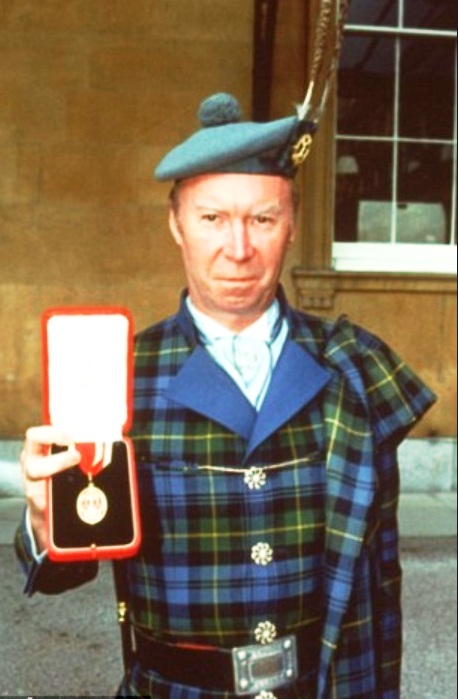 I can say from my limited personal experience (having known only one member of The Spec socially) that it hasn’t; moved with the times that is.
I can say from my limited personal experience (having known only one member of The Spec socially) that it hasn’t; moved with the times that is.
Nicholas Hardwick Fairbairn who succeeded another Spec Member, Sir Alec Douglas-Home as MP for Kinross was to my certain knowledge a racist, sexist bully and a religious bigot (It was later alleged he was much worse but I know nothing of this). How such a man became Solicitor General of Great Britain in 1979 I will never know.
How he was knighted an even bigger mystery, but then he was joining a select few who are looking more ignoble with each passing day’s revelations.
A few exceptions that prove the rule.
Apologists will attack this critique by pointing to the odd Spec member who is of Asian ancestry; a Scottish nationalist, a RC, a decent man from the working classes, or even, even,…wait for it…a woman (Princess Anne was rumoured to be the first woman to have joined recently)!
But these are untypical individuals, simply tokenism; grudging concessions to the growing concerns about a sexist, quasi Masonic society at the heart of Scots life. To me, they are the exceptions that prove the rule.
Those who pounded the table in approval of Prof. Miller’s bombast at the North British Hotel in 1914 are no longer with us, but it is the Spec’s proud boast that it is unchanged over the years and I believe this to be true. The cast of characters may have changed but their heirs and attitudes (like Fairbairn’s) have not.
The Spec’s part in the creation of Israel?
What is, unarguably the case, is that 100 years ago The Speculative Society of Edinburgh, a bastion of conservatism was, in the actions of their Honorary Member Arthur Balfour, pivotal in the creation of the state of Israel.
A. J. Balfour’s active membership of The Spec began in 1904 and continued at least until the 150th anniversary celebrations in 1914. His was no nominal honour whereby the diploma he received was tossed in a drawer and forgotten. No, he was active in the society and would have mixed with the movers and shakers of the day.
In 1904 the persons who immediately preceded him in being bestowed honorary membership were Sir William Turner, Principal of Edinburgh University then The Earl of Rosebery. Coincidentally the same three men, led by Rosebery as Chairman, headed the Spec’s 150th anniversary celebration committee.
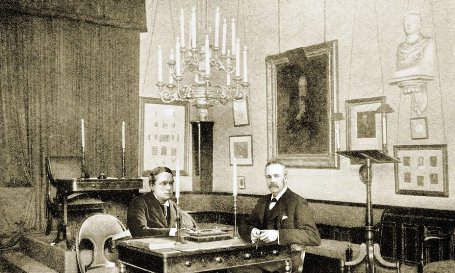 I wonder if this talented trio came together again three years later in formulating the Balfour Declaration?
I wonder if this talented trio came together again three years later in formulating the Balfour Declaration?
Did they draft it in The Spec’s private rooms in the Old College?
Was it written in quill-pen and ink, beneath the 16 candle chandelier (with one holder left vacant) before sending it to the F.O. for approval/typing/onward transmittal?
That of course may be fanciful speculation, but then again the pair had much in common over and above their membership of the Speculative Society of Edinbugh.
Twa Cheeks O’ The Same Airse!
Let us examine the differences between Balfour and Rosebery first; well they did belong to different political parties, but that apart there isn’t a lot to note.
Born in 1847, the son of Lord Dalmeny, Archibald Philip Primrose, later Lord Rosebery, was a member of the Church of Scotland and is buried in the private vault of the Rosebery family in Dalmeny Parish church, Mid Lothian.
Similarly, Arthur James Balfour, 1st Earl of Balfour, born 1848, was a Church of Scotland member and is buried in Whittingehame Parish church, East Lothian, about 30 miles east of Dalmeny.
The two men were major landowners living in neighbouring estates north of Edinburgh and would have been reared in the traditions of the Church of Scotland, which, in 1839, submitted a memorandum to the Protestant Powers of Europe urging the restoration of the Jews in Palestine.
This memorandum followed the tour of Palestine in 1839 by Church of Scotland minister Alexander Keith, D.D. who concluded in his report back to the church that the Jews are “a people without a country; even as their own land [Palestine], as subsequently to be shown, is in a great measure a country without a people.”

Both boys, reared on Christian Zionism, were then, as 13-year-old boys, sent off to be educated Eton in 1860. Later, both, as elderly, experienced politicians, were pivotal in celebrating the 150th anniversary of the Speculative Society of Edinburgh in 1914.
They both had an active interest in politics. Both were former Prime and Foreign Ministers and both had Rothschild interests.
Balfour was for many years a Conservative colleague, friend and fellow aristocrat of Walter, the 2nd Baron Rothschild while Rosebery was married to Walter’s kinswoman, Hannah de Rothschild.
Beyond mere speculation is the fact – evidenced by the arrogant tone of the speeches at the 1914 celebrations – that the members of The Spec were rabid Empire Loyalists who would have approved of Great Britain (meaning England) giving part of a country that didn’t belong to them to their chosen friends in the aristocracy.
In his maiden speech as Prime Minister Rosebery opined: “Before Irish home rule is conceded by an Imperial parliament, England, as the predominant member of the partnership of the three kingdoms will have to be convinced of its justice and equity.”
To these two privileged men Britannia ruled the waves and could do as she jolly-well pleased.
To me it is inconceivable that they never discussed Zionism, the belief which resulted in the letter known as the Balfour Declaration a few years later.
There were of course some slight differences in the two arrogant aristocrats, but in my view they were, nevertheless, twa cheeks o’ the same airse (different in style alone in their arrogance).
Conclusion
Israel today is a state which exhibits apartheid of the sort that A. J. Balfour and his great-nephew approved of. It segregates Palestinians from Jewish settlers, in lands that the Israeli government occupy illegally. That is something that Scotland in general and the Speculative Society of Edinburgh in particular should be ashamed of.
The old-boys’ network which nurtured the attitudes that allowed this to take place in our name, giving disproportionate power to a privileged few, is alive and well in Alba today.
When I first researched The Spec in 2002 over two thirds of Scots Law Lords were undeclared members and today our most influential businessmen, (E.g. Sir Angus Grossart, Scotland’s Mr. Fixit according to Bloomberg), bankers and senior judges are members.
Surely we must examine these organisations, which are the very antithesis of the meritocracy, we, as a modern nation, should be striving to achieve?
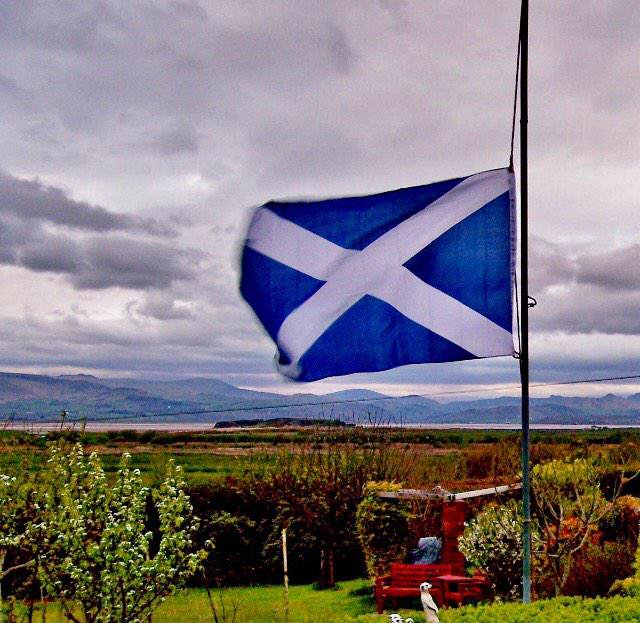 In my opinion a future, independent Scotland, would do well to distance itself from our part in past attitudes and crimes carried out in the name of the British Empire.
In my opinion a future, independent Scotland, would do well to distance itself from our part in past attitudes and crimes carried out in the name of the British Empire.
Perhaps a first step in this act of contrition would be for the Saltire flag to be flown at half-mast from public buildings on the anniversaries of such events?
Starting with the 2nd of November. A date which will live in infamy.
Further reading and full list of members available at:



